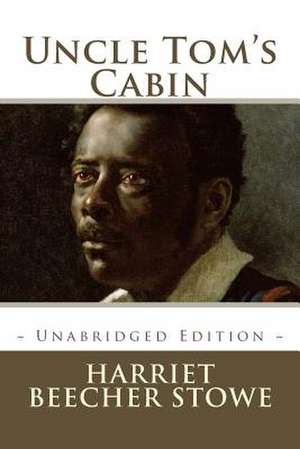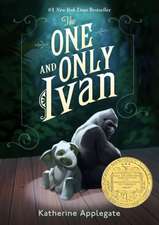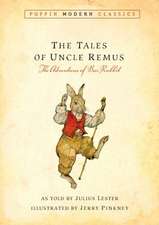Uncle Tom's Cabin
Autor Harriet Beecher Stowe Editat de Atlantic Editionsen Limba Engleză Paperback
Read one of the Greatest American novels of all time in a beautiful edition.
Uncle Tom's Cabin or "Life Among the Lowly" is an anti-slavery novel by Harriet Beecher Stowe.
First published in 1852, this best seller follows the lives of two slaves in Southern United States: Eliza, who escapes slavery with her son, and Tom, African-American slave who must endure humiliation, abuse, and torture inflicted by his wealthy owners.
This fiction embodies the conflict lived among America North and South and has contributed to the outbreak of the Civil War. It also asserts the author's strong belief that Christian love can overcome the worst injustices and reaffirms the importance of women's influence.
This outstanding work is a story of faith, courage, determination, perseverance and the struggle for freedom. It is credited with helping fuel the abolitionist cause in the 1850s.
Referred to as "Great American Novel," it is doubtless the greatest book of anti-slavery ever written.
Harriet Elisabeth Beecher Stowe (1811-1896) was an American active abolitionist and author, born into a prominent family of preachers. She was influential for both her writings and her public stands on social issues of the day.
Find the masterpieces referred to as "Great American Novels" in a beautiful book series by the editor Atlantic Editions:
The Last of the Mohicans, by James Fenimore Cooper
The Scarlet Letter, by Nathaniel Hawthorne
Moby-Dick, by Herman Melville
Uncle Tom's Cabin, by Harriet Beecher Stowe
The Adventures of Tom Sawyer and Huckleberry Finn, by Mark Twain
| Toate formatele și edițiile | Preț | Express |
|---|---|---|
| Paperback (56) | 23.98 lei 3-5 săpt. | +14.01 lei 7-13 zile |
| Wordsworth Classics – 31 iul 1999 | 23.98 lei 3-5 săpt. | +14.01 lei 7-13 zile |
| HarperCollins Publishers – 30 sep 2011 | 25.03 lei 3-5 săpt. | +13.26 lei 7-13 zile |
| Bantam Classics – 30 noi 1982 | 33.35 lei 3-5 săpt. | +10.46 lei 7-13 zile |
| Penguin Random House Group – 26 noi 2009 | 39.25 lei 3-5 săpt. | +10.41 lei 7-13 zile |
| CreateSpace Independent Publishing Platform – | 44.44 lei 3-5 săpt. | |
| HarperCollins Publishers – 6 ian 1970 | 50.56 lei 3-5 săpt. | |
| Oxford University Press – 12 iun 2008 | 51.82 lei 10-16 zile | +23.81 lei 7-13 zile |
| Dover Publications – 31 iul 2005 | 55.68 lei 3-5 săpt. | |
| Random House – 5 feb 2015 | 56.08 lei 26-32 zile | +23.99 lei 7-13 zile |
| UNION SQUARE & CO – 5 aug 2024 | 64.10 lei 3-5 săpt. | +24.30 lei 7-13 zile |
| CREATESPACE – | 64.52 lei 3-5 săpt. | |
| Aladdin – 31 mai 2002 | 68.32 lei 3-5 săpt. | |
| CREATESPACE – | 68.92 lei 3-5 săpt. | |
| CreateSpace Independent Publishing Platform – | 69.01 lei 3-5 săpt. | |
| Library of America – 31 iul 2010 | 78.79 lei 3-5 săpt. | |
| West Margin Press – 2 dec 2020 | 116.24 lei 3-5 săpt. | |
| – | 120.56 lei 3-5 săpt. | |
| CREATESPACE – | 120.97 lei 3-5 săpt. | |
| – | 133.23 lei 3-5 săpt. | |
| BROADVIEW PRESS LTD – 31 mar 2009 | 133.88 lei 3-5 săpt. | +30.80 lei 7-13 zile |
| Les Prairies Numeriques – 27 iul 2020 | 142.05 lei 3-5 săpt. | |
| CREATESPACE – | 157.30 lei 3-5 săpt. | |
| CreateSpace Independent Publishing Platform – | 165.32 lei 3-5 săpt. | |
| – | 167.34 lei 3-5 săpt. | |
| – | 173.45 lei 3-5 săpt. | |
| – | 201.47 lei 3-5 săpt. | |
| – | 268.75 lei 3-5 săpt. | |
| 12th Media Services – 9 dec 2017 | 92.40 lei 6-8 săpt. | |
| – | 97.56 lei 6-8 săpt. | |
| Alicia Editions – 20 aug 2020 | 113.44 lei 6-8 săpt. | |
| CreateSpace Independent Publishing Platform – | 113.48 lei 6-8 săpt. | |
| Digireads.com – 28 ian 2016 | 113.95 lei 6-8 săpt. | |
| Chump Change – feb 2018 | 121.28 lei 38-44 zile | |
| CreateSpace Independent Publishing Platform – 2 dec 2015 | 124.62 lei 6-8 săpt. | |
| CreateSpace Independent Publishing Platform – 2 dec 2015 | 124.79 lei 6-8 săpt. | |
| COSIMO CLASSICS – 31 iul 2009 | 126.21 lei 6-8 săpt. | |
| Public Park Publishing – 9 ian 2020 | 127.29 lei 6-8 săpt. | |
| SMK Books – 25 dec 2011 | 130.66 lei 6-8 săpt. | |
| CreateSpace Independent Publishing Platform – 3 dec 2015 | 131.71 lei 6-8 săpt. | |
| CREATESPACE – | 139.22 lei 6-8 săpt. | |
| www.bnpublishing.com – 30 iun 2013 | 139.85 lei 38-44 zile | |
| Applewood Books – 27 mar 2013 | 148.47 lei 6-8 săpt. | |
| AZILOTH BOOKS – 3 iun 2021 | 164.13 lei 38-44 zile | |
| Aegypan Press – 30 sep 2005 | 168.28 lei 6-8 săpt. | |
| True Sign Publishing House – mar 2021 | 191.00 lei 6-8 săpt. | |
| 1st World Library – | 196.11 lei 6-8 săpt. | |
| Simon & Brown – 30 apr 2011 | 232.85 lei 38-44 zile | |
| Simon & Brown – 5 noi 2018 | 247.58 lei 38-44 zile | |
| Simon & Brown – 19 noi 2018 | 263.15 lei 38-44 zile | |
| Simon & Brown – 31 oct 2011 | 269.67 lei 38-44 zile | |
| Simon & Brown – 31 ian 2012 | 270.31 lei 38-44 zile | |
| SKYE RYAN – 29 feb 2012 | 270.31 lei 38-44 zile | |
| Kessinger Publishing – 14 oct 2009 | 282.19 lei 38-44 zile | |
| Echo Library – 31 aug 2006 | 287.49 lei 38-44 zile | |
| tredition GmbH – 31 oct 2011 | 304.61 lei 6-8 săpt. | |
| Echo Library – 30 apr 2006 | 343.19 lei 38-44 zile | |
| Hardback (19) | 49.75 lei 3-5 săpt. | +35.22 lei 7-13 zile |
| Pan Macmillan – 5 mar 2020 | 49.75 lei 3-5 săpt. | +35.22 lei 7-13 zile |
| EVERYMAN – 27 apr 1995 | 84.70 lei 26-32 zile | +36.91 lei 7-13 zile |
| Prakash Books – 24 aug 2024 | 106.61 lei 3-5 săpt. | |
| Mint Editions – 15 noi 2020 | 169.22 lei 3-5 săpt. | |
| 12th Media Services – 9 dec 2017 | 143.58 lei 6-8 săpt. | |
| Public Park Publishing – 15 ian 2020 | 153.50 lei 6-8 săpt. | |
| Chump Change – 2 feb 2018 | 158.01 lei 6-8 săpt. | |
| Alicia Editions – 21 aug 2020 | 181.08 lei 6-8 săpt. | |
| Oxford University Press – 23 iun 2011 | 190.79 lei 31-37 zile | |
| Suzeteo Enterprises – 30 mai 2019 | 192.34 lei 6-8 săpt. | |
| SMK Books – 3 apr 2018 | 209.46 lei 6-8 săpt. | |
| COSIMO CLASSICS – 31 iul 2009 | 243.10 lei 6-8 săpt. | |
| – | 287.41 lei 38-44 zile | |
| Simon & Brown – 5 noi 2018 | 299.34 lei 38-44 zile | |
| Simon & Brown – 19 noi 2018 | 318.22 lei 38-44 zile | |
| 1st World Library – | 318.79 lei 6-8 săpt. | |
| – | 323.84 lei 38-44 zile | |
| – | 324.48 lei 38-44 zile | |
| Simon & Brown – 24 noi 2011 | 329.64 lei 38-44 zile |
Preț: 120.56 lei
Nou
23.09€ • 23.79$ • 19.37£
Carte disponibilă
Livrare economică 01-15 februarie
Specificații
ISBN-10: 1523374047
Pagini: 440
Dimensiuni: 152 x 229 x 23 mm
Greutate: 0.59 kg
Descriere
`So you're the little woman who wrote the book that started this great war!' These words, said to have been uttered by Abraham Lincoln, signal the celebrity of Uncle Tom's Cabin. The first American novel to become an international best-seller, Stowe's novel charts the progress from slavery to freedom of fugitives who escape the chains of American chattel slavery, and of a martyr who transcends all earthly ties. At the middle of the nineteenth-century, the names of its characters - Little Eva, Topsy, Uncle Tom - were renowned. A hundred years later, `Uncle Tom' still had meaning, but, to Blacks everywhere it had become a curse. This edition firmly locates Uncle Tom's Cabin within the context of African-American writing, the issues of race and the role of women. Its appendices include the most important contemporary African-American literary responses to the glorification of Uncle Tom's Christian resignation as well as excerpts from popular slave narratives, quoted by Stowe in her justification of the dramatization of slavery, Key to Uncles Tom's Cabin. ABOUT THE SERIES: For over 100 years Oxford World's Classics has made available the widest range of literature from around the globe. Each affordable volume reflects Oxford's commitment to scholarship, providing the most accurate text plus a wealth of other valuable features, including expert introductions by leading authorities, helpful notes to clarify the text, up-to-date bibliographies for further study, and much more.
Notă biografică
Extras
over their wine, in a well-furnished dining parlor, in the town of P—, in Kentucky.
There were no servants present, and the gentlemen, with chairs closely
approaching, seemed to be discussing some subject with great earnestness.
For convenience sake, we have said, hitherto, two gentlemen. One of the parties,
however, when critically examined, did not seem, strictly speaking, to come under
the species. He was a short, thick-set man, with coarse, commonplace features, and
that swaggering air of pretension which marks a low man who is trying to elbow his
way upward in the world. He was much over-dressed, in a gaudy vest of many
colors, a blue neckerchief, bedropped gayly with yellow spots, and arranged with a
flaunting tie, quite in keeping with the general air of the man. His hands, large and
coarse, were plentifully bedecked with rings; and he wore a heavy gold
watch-chain, with a bundle of seals of portentous size, and a great variety of colors,
attached to it,—which, in the ardor of conversation, he was in the habit of
flourishing and jingling with evident satisfaction. His conversation was in free and
easy defiance of Murray's Grammar, and was garnished at convenient intervals with
various profane expressions, which not even the desire to be graphic in our account
shall induce us to transcribe.
His companion, Mr. Shelby, had the appearance of a gentleman; and the
arrangements of the house, and the general air of the housekeeping, indicated easy,
and even opulent circumstances. As we before stated, the two were in the midst of
an earnest conversation.
'That is the way I should arrange the matter,' said Mr. Shelby.
'I can't make trade that way—I positively can't, Mr. Shelby,' said the other, holding
up a glass of wine between his eye and the light.
'Why, the fact is, Haley, Tom is an uncommon fellow; he is certainly worth that sum
anywhere—steady, honest, capable, manages my whole farm like a clock.'
'You mean honest, as niggers go,' said Haley, helping himself to a glass of brandy.
'No; I mean, really, Tom is a good, steady, sensible, pious fellow. He got religion at
a camp-meeting, four years ago; and I believe he really did get it. I've trusted him,
since then, with everything I have,—money, house, horses,—and let him come and
go round the country; and I always found him true and square in everything.'
'Some folks don't believe there is pious niggers, Shelby,' said Haley, with a candid
flourish of his hand, 'but I do. I had a fellow, now, in this yer last lot I took to
Orleans—'twas as good as a meetin', now, really, to hear that critter pray; and he was
quite gentle and quiet like. He fetched me a good sum, too, for I bought him cheap
of a man that was 'bliged to sell out; so I realized six hundred on him. Yes, I consider
religion a valeyable thing in a nigger, when it's the genuine article, and no mistake.'
'Well, Tom's got the real article, if ever a fellow had,' rejoined the other. 'Why, last
fall, I let him go to Cincinnati alone, to do business for me, and bring home five
hundred dollars. 'Tom,' says I to him, 'I trust you, because I think you're a
Christian—'I know you wouldn't cheat.' Tom comes back, sure enough; I knew he
would. Some low fellows, they say, said to him—'Tom, why don't you make tracks
for Canada?' 'Ah, master trusted me, and I couldn't'—they told me about it. I am sorry
to part with Tom, I must say. You ought to let him cover the whole balance of the
debt; and you would, Haley, if you had any conscience.'
'Well, I've got just as much conscience as any man in business can afford to
keep,—just a little, you know, to swear by, as 'twere,' said the trader, jocularly; 'and
then, I'm ready to do anything in reason to 'blige friends; but this yer, you see, is a
leetle too hard on a fellow—a leetle too hard.' The trader sighed contemplatively, and
poured out some more brandy.
'Well, then, Haley, how will you trade?' said Mr. Shelby, after an uneasy interval of
silence.
'Well, haven't you a boy or gal that you could throw in with Tom?'
'Hum!—none that I could well spare; to tell the truth, it's only hard necessity makes
me willing to sell at all. I don't like parting with any of my hands, that's a fact.'
Here the door opened, and a small quadroon boy, between four and five years of
age, entered the room. There was something in his appearance remarkably beautiful
and engaging. His black hair, fine as floss silk, hung in glossy curls about his
round, dimpled face, while a pair of large dark eyes, full of fire and softness, looked
out from beneath the rich, long lashes, as he peered curiously into the apartment. A
gay robe of scarlet and yellow plaid, carefully made and neatly fitted, set off to
advantage the dark and rich style of his beauty; and a certain comic air of
assurance, blended with bashfulness, showed that he had been not unused to
being petted and noticed by his master.
From the Trade Paperback edition.
Recenzii
—Alfred Kazin
From the Trade Paperback edition.
Textul de pe ultima copertă
With its gripping plot and pungent dialogue, Uncle Tom's Cabin offers readers today a passionate portrait of a nation on the verge of disunion and a surprisingly subtle examination of the relationship between race and nationalism that has always been at the heart of the American experience. This Broadview edition is based upon the first American edition of the novel and reprints its original illustrations and preface. In addition, it reprints all of the prefaces that Stowe wrote for authorized European editions of Uncle Tom's Cabin, offers a wide array of appendices that clarify the novel's participation in antebellum debates about domesticity, colonization, abolitionism, and the law, and includes sections on dramatic adaptations of the novel.





















